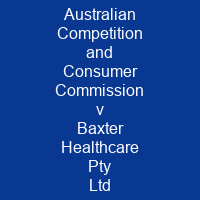Understanding the Australian Competition and Consumer Commission v Baxter Healthcare Pty Ltd Case
The High Court of Australia ruled on August 29, 2007, that Baxter Healthcare Proprietary Limited was bound by the Trade Practices Act 1974 in its trade and commerce in tendering for government contracts. This decision marked a significant turning point in how derivative governmental immunity is interpreted in Australian law.
Background of the Case
Baxter Healthcare Pty Ltd, an Australian subsidiary of Baxter International, held a monopoly in the IV fluid market from the early 1990s to the late 2000s. However, in the PD market, they faced competition. The Australian Competition & Consumer Commission (ACCC) investigated and prosecuted Baxter for abuse of market power under the Trade Practices Act.
The Legal Framework
What exactly did the ACCC allege against Baxter? They alleged that Baxter’s offers were designed to eliminate competition through a ‘cherry pick’ offer with no commitments to purchase specific amounts of products. The relevant provisions of the Trade Practices Act 1974 included Section 46 (prohibiting corporate misuse of market power), Section 47 (prohibiting exclusive dealing), and Section 2B (binding the Crown in right of states, territories, and the Australian Capital Territory).
The High Court’s Decision
How did the High Court rule on this case? The High Court allowed the ACCC’s appeal, ending eight years of litigation. The decision was a significant precedent in the law of derivative governmental immunity in Australia.
Derivative Governmental Immunity Explained
What is derivative governmental immunity all about? It refers to extending a government’s immunity to non-government parties based on the potential impact on the government if the statute applies to the other party. Prior to Baxter, the leading case was Bradken Consolidated Ltd v Broken Hill Pty Co Ltd (1979), which upheld derivative governmental immunity by equipment suppliers to the Queensland Commissioner for Railways.
The Legal Battle
Baxter argued it was also covered by this immunity, but the Federal Court found in its favour at first instance. The judgment was upheld unanimously on appeal to the full bench, which expressed unease about its own decision. The ACCC appealed to the High Court, which allowed their appeal and remitted the matter back to the full bench of Federal Court for reconsideration.
The Majority Judgment
A 6-1 majority judgment held that Baxter was not covered by derivative governmental immunity in its dealings with state governments. Having examined the characteristics of the TPA as a law to promote competitive behaviour, the joint judgment held that the extension of derivative governmental immunity from the TPA to a trading corporation would be ‘remarkable’ and ‘far beyond what is necessary’.
Justice Kirby’s Judgment
What did Justice Kirby say about this decision? His judgment agreed with the outcome of the joint judgment for different reasons.
Justice Callinan’s Dissent
Why did Justice Callinan disagree with the majority? He held that derivative governmental immunity extended to Baxter. This dissent highlights the complexity and uncertainty surrounding this legal issue.
The Impact of the Decision
The judgment was reported in the press as a significant legal victory for the ACCC, setting a precedent for government procurement. However, Nicholas Seddon claimed the High Court’s judgment leaves ‘many uncertainties’. Robert Wright echoed these concerns, arguing the joint judgment did not ‘set out in as helpful detail’ the factors to be taken into account in deciding whether governmental immunity will derive to a party dealing with the government.
The Final Verdict
As a result of the High Court’s decision, the full bench found that Baxter contravened Sections 46 and 47 of the TPA. This ruling not only had implications for Baxter but also set a precedent for future cases involving derivative governmental immunity.

This case serves as a reminder of the complex legal landscape surrounding government contracts and competition laws. It highlights the ongoing challenges in balancing corporate interests with consumer protection, all while navigating the intricate web of governmental immunity.
You want to know more about Australian Competition and Consumer Commission v Baxter Healthcare Pty Ltd?
This page is based on the article Australian Competition and Consumer Commission v Baxter Healthcare Pty Ltd published in Wikipedia (retrieved on November 30, 2024) and was automatically summarized using artificial intelligence.







